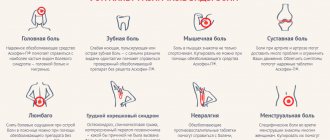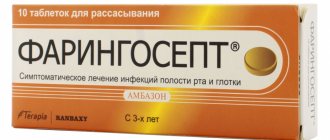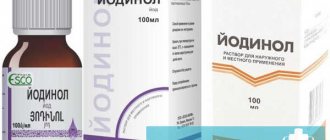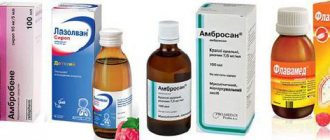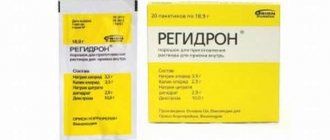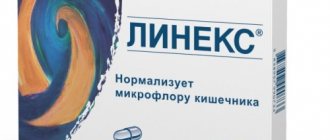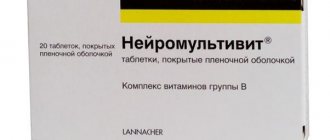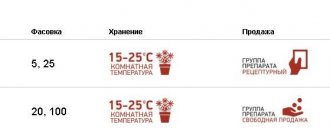Prohibited during pregnancy
Prohibited during breastfeeding
Prohibited for children
Has restrictions for older people
Has limitations for liver problems
Has limitations for kidney problems
Rinicold is a medication that is used to treat the acute stage of viral and infectious respiratory pathologies with the following symptoms: runny nose, joint and headaches, fever. According to the instructions for use, Rinicold should be started taking the medication at the first signs of the disease, which will significantly speed up recovery and shorten the duration of the medication course.
Pharmacology and pharmacodynamics
As already mentioned, the drug has analgesic, anticongestive and antipyretic effects.
Paracetamol is a powerful analgesic and reduces the risk of adverse reactions.
Phenylephrine has a vasoconstrictor effect. Helps cope with stuffy nose and runny nose.
Chlorphenamine has antiallergic and decongestant effects. Eliminates allergy symptoms and facilitates breathing.
Caffeine has a stimulating effect, thereby affecting the central nervous system. The component leads to a decrease in fatigue and drowsiness.
Release form and composition
Dosage form - tablets: oval, biconvex, white, with a separating line on one side (10 pieces in blisters or strips, 1, 2, 3 or 4 blisters or strips in a cardboard pack).
Content of Rinicold active substances in 1 tablet:
- Paracetamol: 0.5 g;
- Phenylephrine hydrochloride: 0.01 g;
- Caffeine: 0.03 g;
- Chlorphenamine maleate: 0.002 g.
Auxiliary components: sodium starch glycolate, polyvinylpyrrolidone, microcrystalline cellulose, methylparaben, gelatin, starch, talc, magnesium stearate, propylparaben.
Contraindications
The instructions for the drug contain a list of contraindications that you should read before taking it. These include:
- lactation period;
- period of bearing a child;
- age up to 6 years;
- parallel use of products with the same active ingredients;
- increased susceptibility to constituent elements.
It should be taken with caution if you have diseases of the blood, kidneys, liver, thyroid gland, bronchial asthma, or high blood sugar levels.
Side effects of the drug and overdose
Adverse reactions of the body most often occur from incorrect dosage of the drug or during a long period of use. The main negative effects that the manufacturer of Rinicold warns about are presented in the table.
| Body systems | Adverse reactions |
| Heart and circulatory system: |
|
| Vision: |
|
| CNS: |
|
| Hematopoietic system: |
|
| Digestive tract: |
|
| Organs of the urinary system: |
|
| Respiratory system: |
|
| Allergy: |
|
Most often, an overdose is provoked by paracetamol. The main signs of overdose are:
- pale skin;
- shortness of breath;
- tachycardia;
- increased blood pressure;
- facial redness;
- severe nausea that provokes vomiting;
- anorexia;
- increased transaminase enzyme;
- convulsions;
- the period of prothrombin time increases.
In severe cases of overdose, hospitalization is urgently required for symptomatic treatment, and methionine must be administered to the patient 8 hours after the overdose.
Mild overdose can be treated independently:
- rinse the stomach with plenty of water;
- take sorbents to remove toxins from the body;
- if necessary, take laxatives.
Adverse reactions and overdose
Taking medication in some cases can provoke unwanted reactions. They may present with the following symptoms:
- problems sleeping, insomnia;
- dizziness, headache;
- feeling of dry mouth, nausea;
- allergies manifested by skin rashes.
If you follow the permissible dosage, then the likelihood of side effects is almost zero.
If the specified dose is frequently exceeded, an overdose of the drug may occur. It is characterized by the following symptoms: pale skin, vomiting, pain in the liver area.
If such symptoms appear, you need to rinse the stomach and begin symptomatic treatment.
Drug interactions
With simultaneous use of Rinicold:
- Ethanol – enhances its effect;
- Psycholeptic drugs – increase the sedative effect;
- Antidepressants, antipsychotic and antiparkinsonian drugs, phenothiazine derivatives (trifluoperazine, chlorpromazine, levomepromazine) - contribute to increased dry mouth, the risk of urinary retention, and the development of constipation;
- Glucocorticosteroids – increase the likelihood of developing glaucoma;
- Furazolidone, MAO inhibitors - can cause agitation, hypertensive crisis;
- Tricyclic antidepressants – enhance the sympathomimetic effect of the drug;
- Guanethidine - enhances the alpha-adrenergic stimulating effect of phenylephrine, but reduces its hypotensive effect;
- Halothane – increases the risk of ventricular arrhythmia.
How to replace Rinikold
If there is a need to replace the medicine, then you should pay attention to the following drugs: Antigrippin, Rinza, Paracetamol, Coldrex.
Drugs that have a similar composition and effect include:
RiniCold Hotmix. Doctors claim that this drug contains the same active elements as Rinicold. The only difference is the form of production. The analogue is available in powder form. You need to pour the contents of the bag into a cup and fill it with hot water. Stir everything well until the powder is completely dissolved. The drug has the same indications as the drug in question.
RiniCold Broncho. According to patient reviews, it can be argued that the drug has an expectorant, antihistamine and antipyretic effect. The components of the drugs are slightly different. The medicine helps suppress the symptoms of colds and flu, in particular it fights fever, nasal congestion, nasal mucus and cough. Sold in the form of syrup.
General information about the drug
The drug belongs to the group of medications that affect the respiratory system. This is an analgesic, non-narcotic drug + alpha-adrenergic agonist + psychostimulant medication + histamine receptor blocker. INN – RINICOLD Caffeine+Paracetamol+Phenylephrine+Pheniramine.
Description of the drug
Rinicold is a combination drug for the treatment of respiratory diseases in the acute stage of development. The drug has the following effects on the body:
- antipyretic;
- analgesic;
- vasoconstrictor;
- anti-allergenic.
Thanks to these properties and effects on the centers of the nervous system, the symptoms of a cold disappear in a short period of time.
Release form
The drug is produced by the manufacturer in three forms - tablets for oral use, syrup and a dry mixture for preparing a drink with different flavorings (lemon, orange and pineapple).
The tablets are oval-shaped with a mark where they are broken in half and convex on both sides. The color of the tablets is white. Tablets are packaged in strips or blisters of 10 pieces. Cardboard boxes contain 1, 2 or 3 blisters.
Syrup for oral use Rinicold Broncho - the contents of the syrup are packaged in transparent brown plastic bottles with screw caps, which are childproof and control the first opening. The dosage of the medicine bottle is 100 ml. An annotation for the medicine is packed in a cardboard box along with the bottle.
Powder for making the Rinicold Hotmix drink is a dry powder mixture of a yellow hue. When dissolved in 200 ml of warm water, the result is a yellow drink with a slight greenish tint. The powder is packaged in 5 grams in laminated and cardboard boxes. The box contains 5 or 10 packets and instructions for their use in the treatment of colds.
The average prices of the drug Rinicold in the Russian Federation are presented in the table.
| Types of the drug Rinikold | Number of pieces per package | Release form | Cost in rubles |
| Hotmix | 5 5 5 | lemon dry mix orange powder pineapple powder | 93-100 97-110 94-120 |
| Broncho | 100 | syrup | 168-210 |
| Rinicold | 10 | pills | 94-120 |
Reviews about the drug Rinicold
Patients who have already tried the medicine assure that it copes well with the symptoms of colds and flu. Most reviews are positive.
The result of taking it can be observed almost immediately. Patients note a noticeable improvement in their well-being, headaches and discomfort in joints and muscles disappear. After 2-3 days, nasal congestion and mucus secretion, as well as other cold symptoms, disappear. The drug also helps to completely overcome cough.
Thus, medicines and its analogues with a similar composition allow the patient to feel much better during colds. In this case, the effect will be immediate.
The drug also has neutral reviews, but there are very few of them. Some patients claim that no results were achieved after taking it. There is also a category of patients who, after taking it, developed undesirable reactions in the form of a skin rash. Doctors say that after stopping the drug, adverse reactions immediately disappear. The undeniable advantage of the medicine is its low price.
Rinicold
Rinicold (paracetamol + phenylephrine + chlorpheniramine + caffeine) is a combination drug to eliminate the symptoms of acute respiratory diseases (ARI). With the onset of the autumn-winter period, the incidence of influenza and acute respiratory infections increases sharply. Lack of timely treatment increases the risk of complications that can ultimately seriously damage health and even be fatal, no matter how dramatic this may sound. Unsatisfactory results of treatment of acute respiratory infections are explained, among other things, by monotherapy, when the drug course is based on any one locally acting drug (adrenergic agonist, local anesthetic), non-steroidal inflammatory drug (NSAID) or antihistamine. Combined pharmacotherapy with several drugs also, unfortunately, cannot be considered a panacea, since it is often fraught with errors in determining the dosage and administration regimen. The optimal way out of the situation may be therapy with multicomponent drugs that provide multidirectional pharmacological effects that develop as a result of the simultaneous administration of ingredients that differ in their mechanism of action, but complement and potentiate each other’s action. A promising area of pharmacotherapy for acute respiratory infections and influenza is the use of combination drugs, whose action is designed to inhibit or completely eliminate the mechanisms of development of clinical manifestations of the disease. A harmonious combination of doses of active components, taking into account their pharmacological compatibility and synergistic action, ensures faster and more effective relief of the patient from a “bouquet” of pathological symptoms and is guaranteed to improve his quality of life. One such drug is Rinicold from Indian Pharmaceuticals. This 4-component drug has analgesic, antipyretic, anti-inflammatory and anti-edematous effects. Rinicold successfully copes with almost any symptoms of influenza and acute respiratory infections: febrile fever, runny nose and nasal congestion, headaches and musculoskeletal pain, drowsiness and fatigue.
The key component of Rinicold is the analgesic-antipyretic paracetamol. Its characteristic feature is the variety of pharmacological effects, primarily analgesic, antipyretic and mild anti-inflammatory. Paracetamol is safe for the mucous membrane of the digestive tract. It is quickly absorbed into the systemic circulation, practically without interacting with blood plasma proteins. Phenylephrine stimulates alpha-1 adrenergic receptors of the vascular wall, has a vasoconstrictor effect, reduces the permeability of blood vessels, thereby reducing swelling of the nasal mucosa and facilitating nasal breathing. Unlike another common component of combined cold medications - phenylpropanolamine, the vasoconstrictor effect of phenylephrine is purely peripheral in nature and does not cause such undesirable side effects as increased blood pressure, heart rhythm disturbances, and headaches. Chlorpheniramine is a H1-histamine receptor blocker. It has an antiallergic effect, reduces the permeability of the walls of blood vessels, eliminates excess blood filling and swelling of the mucous membrane of the nasal cavity and sinuses, reduces rhinorrhea, lacrimation, itching and sneezing. The relatively low (2 mg) content of chlorpheniramine in Rinicold reduces the likelihood of developing sedation. Caffeine has a general tonic effect, reduces the risk of the sedative effect of chlorpheniramine, and improves overall well-being.
Rinikold is available in tablets. Adults take the drug 1-2 tablets every 4-6 hours, without exceeding the daily maximum of 8 tablets. Children over 6 years old take no more than 1 tablet every 4-6 hours (up to 4 times a day). The duration of the medication course is no more than 5 days. Alcohol and sedatives are contraindicated during treatment with rinicold.
Pharmacological properties
The numerous pharmacological effects of the drug "Rinicold", the instructions for use confirm this, are quite explainable by the following active components included in its composition:
- Paracetamol has analgesic and antipyritic effects;
- Phenylephrine is known for its pronounced vasoconstrictor effect, which helps to significantly reduce discharge from the nasal passages;
- Chlorphenamine helps reduce swelling of the nasal tissues, reduces vascular permeability, and also helps to quickly eliminate the symptoms of allergic rhinitis;
- Caffeine perfectly stimulates the activity of the central nervous system structures, helps fight the tendency to drowsiness, and also maximizes physical and intellectual performance;
- Guaifenesin and Ambroxol dilute bronchial secretions, which facilitates expectoration.
By
Similar medications
Analogues of the drug Rinicold are those drugs that have a similar composition or therapeutic properties. The main substitutes most often prescribed for acute respiratory viral infections and acute respiratory infections:
Coldrex - the drug has an almost similar composition and also 3 release forms. It is allowed to take tablets and powder from the age of 12, and syrup from the age of 6. The medication effectively fights viral and infectious agents from the first hours of their appearance in the body. An effective drug for emergency treatment at the initial stage of development of a cold.- Agri is a medicine that must be taken from the first days of the development of flu and colds. The drug is contraindicated for children and pregnant women. Agri relieves the symptoms of viral diseases for several days.
- Bronchostop - the drug is available in the form of hexagonal lozenges and syrup. Effectively clears mucus from the bronchi and also reduces the frequency of coughing attacks. It is used for both dry and wet coughs. The drug helps lower the temperature and has an analgesic effect.
Syrup, Rinicold tablets: what does the medicine help with?
The use of the drug "Rinicold" is justified for symptomatic care in the case of diseases such as acute respiratory viral infections and influenza.
Other indications for use in the instructions indicate:
- feverish conditions;
- pain impulses in various areas of the head;
- sensations of aching muscles;
- discomfort in the joints;
- general unmotivated lethargy and weakness;
- swelling of the tissues of the nasal passages due to allergic and non-allergic mechanisms of occurrence.
Another indication is sinusitis and rhinitis.

